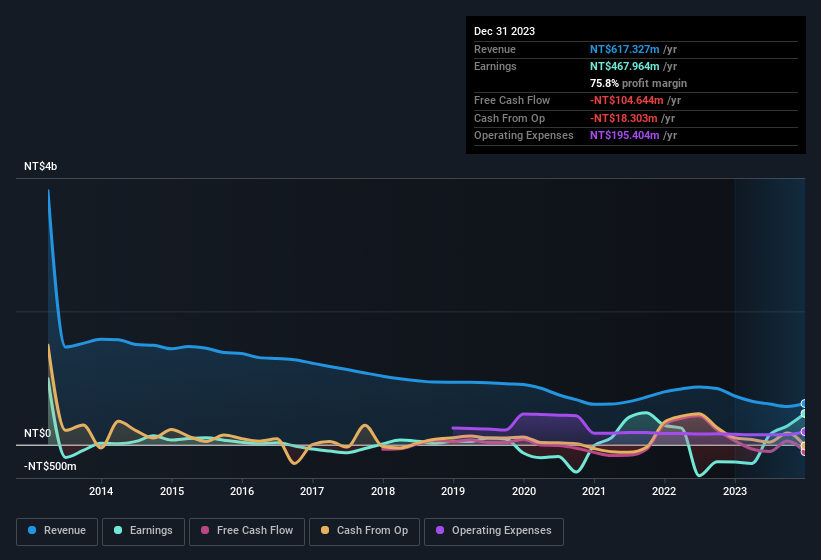- Taiwan
- /
- Transportation
- /
- TWSE:2611
Tze Shin International's (TWSE:2611) Solid Earnings May Rest On Weak Foundations

Tze Shin International Co., Ltd. (TWSE:2611) just released a solid earnings report, and the stock displayed some strength. While the profit numbers were good, our analysis has found some concerning factors that shareholders should be aware of.
Check out our latest analysis for Tze Shin International

Examining Cashflow Against Tze Shin International's Earnings
As finance nerds would already know, the accrual ratio from cashflow is a key measure for assessing how well a company's free cash flow (FCF) matches its profit. To get the accrual ratio we first subtract FCF from profit for a period, and then divide that number by the average operating assets for the period. You could think of the accrual ratio from cashflow as the 'non-FCF profit ratio'.
Therefore, it's actually considered a good thing when a company has a negative accrual ratio, but a bad thing if its accrual ratio is positive. While it's not a problem to have a positive accrual ratio, indicating a certain level of non-cash profits, a high accrual ratio is arguably a bad thing, because it indicates paper profits are not matched by cash flow. To quote a 2014 paper by Lewellen and Resutek, "firms with higher accruals tend to be less profitable in the future".
Tze Shin International has an accrual ratio of 0.40 for the year to December 2023. As a general rule, that bodes poorly for future profitability. And indeed, during the period the company didn't produce any free cash flow whatsoever. Even though it reported a profit of NT$468.0m, a look at free cash flow indicates it actually burnt through NT$105m in the last year. We saw that FCF was NT$61m a year ago though, so Tze Shin International has at least been able to generate positive FCF in the past. The good news for shareholders is that Tze Shin International's accrual ratio was much better last year, so this year's poor reading might simply be a case of a short term mismatch between profit and FCF. As a result, some shareholders may be looking for stronger cash conversion in the current year.
Note: we always recommend investors check balance sheet strength. Click here to be taken to our balance sheet analysis of Tze Shin International.
Our Take On Tze Shin International's Profit Performance
As we have made quite clear, we're a bit worried that Tze Shin International didn't back up the last year's profit with free cashflow. As a result, we think it may well be the case that Tze Shin International's underlying earnings power is lower than its statutory profit. On the bright side, the company showed enough improvement to book a profit this year, after losing money last year. Of course, we've only just scratched the surface when it comes to analysing its earnings; one could also consider margins, forecast growth, and return on investment, among other factors. If you want to do dive deeper into Tze Shin International, you'd also look into what risks it is currently facing. Every company has risks, and we've spotted 3 warning signs for Tze Shin International (of which 2 are a bit unpleasant!) you should know about.
This note has only looked at a single factor that sheds light on the nature of Tze Shin International's profit. But there are plenty of other ways to inform your opinion of a company. Some people consider a high return on equity to be a good sign of a quality business. While it might take a little research on your behalf, you may find this free collection of companies boasting high return on equity, or this list of stocks that insiders are buying to be useful.
Valuation is complex, but we're here to simplify it.
Discover if Tze Shin International might be undervalued or overvalued with our detailed analysis, featuring fair value estimates, potential risks, dividends, insider trades, and its financial condition.
Access Free AnalysisHave feedback on this article? Concerned about the content? Get in touch with us directly. Alternatively, email editorial-team (at) simplywallst.com.
This article by Simply Wall St is general in nature. We provide commentary based on historical data and analyst forecasts only using an unbiased methodology and our articles are not intended to be financial advice. It does not constitute a recommendation to buy or sell any stock, and does not take account of your objectives, or your financial situation. We aim to bring you long-term focused analysis driven by fundamental data. Note that our analysis may not factor in the latest price-sensitive company announcements or qualitative material. Simply Wall St has no position in any stocks mentioned.
About TWSE:2611
Tze Shin International
Primarily provides transportation services in Taiwan.
Good value with proven track record and pays a dividend.
Market Insights
Community Narratives




